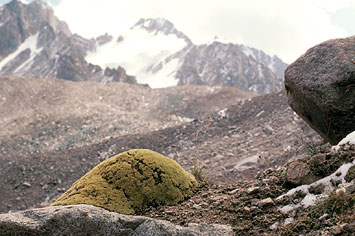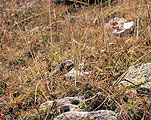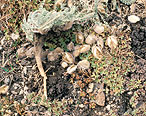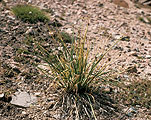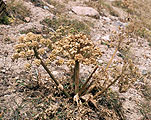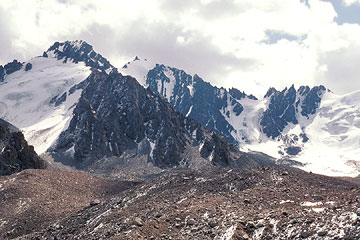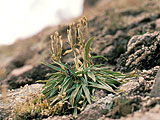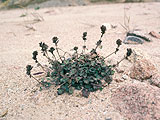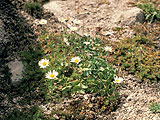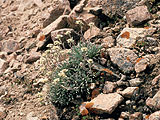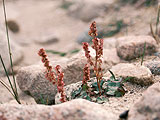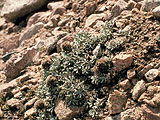 |
|
|
|
|
|
|
The Tien Shan Mts. form the northern rim of the large central Asian mountain system enveloping the Tibetan plateau. To the north, the foothills lead into the Kazakh steppe, to the east, ranges smooth out into the Mongolian highlands. Long, very cold winters and warm, dry summers characterise the large, glaciated temperate zone mountain range. The examples presented here are from the front ranges which can be reached in a few hours from Almati, the capital of Kazakhstan. Peaks exceed 4000 m. |
|
1 - Alpine grassland and mega-cushions (2900-3200 m). |
|
|
2 - A dry midsummer aspect of S-exposed Kobresia (Cyperaceae) grassland at 3100 m elevation. As many as 70 species of higher plants can be found here within 10 m2. |
3 - Both massively tap rooted Oxytropis sp. (Fabaceae) (3300 m, shown here) and Astragalus sp. (Fabaceae) (2900 m) show root nodules (nitrogen fixing symbionts). |
4 - An unexpected find: an alpine onion, Allium atrosanguineum (Alliaceae) at 3300 m. |
5 - A giant Apiaceae: Angelica brevicaulis (3300 m), reminiscent of Angelica archangelica in the European arctic. |
|
6 - The Tien Shan, a geologically young, steep and glaciated mountain range (a buried block glacier in the foreground at 3100 m). |
|
|
7 - Gentiana sp. (Gentianaceae) (3300 m) |
8 - Dracocephalum sp. (Lamiaceae) |
9 - Tripleurospermum af. ambiguum (Asteraceae) (3300 m) |
|
10 - Leontopodium sp. (Asteraceae) (3200 m). Central Asia is the "home of Edelweiss". |
11 - The circumpolar Oxyria digyna (Polygonaceae). |
12 - Saussurea sp. (Asteraceae) (3300 m), a representative of the genus which holds the high elevation record in the Annapurna-Everest region at ca. 6300 m. |
29 August 2011 |
||
| |
||
